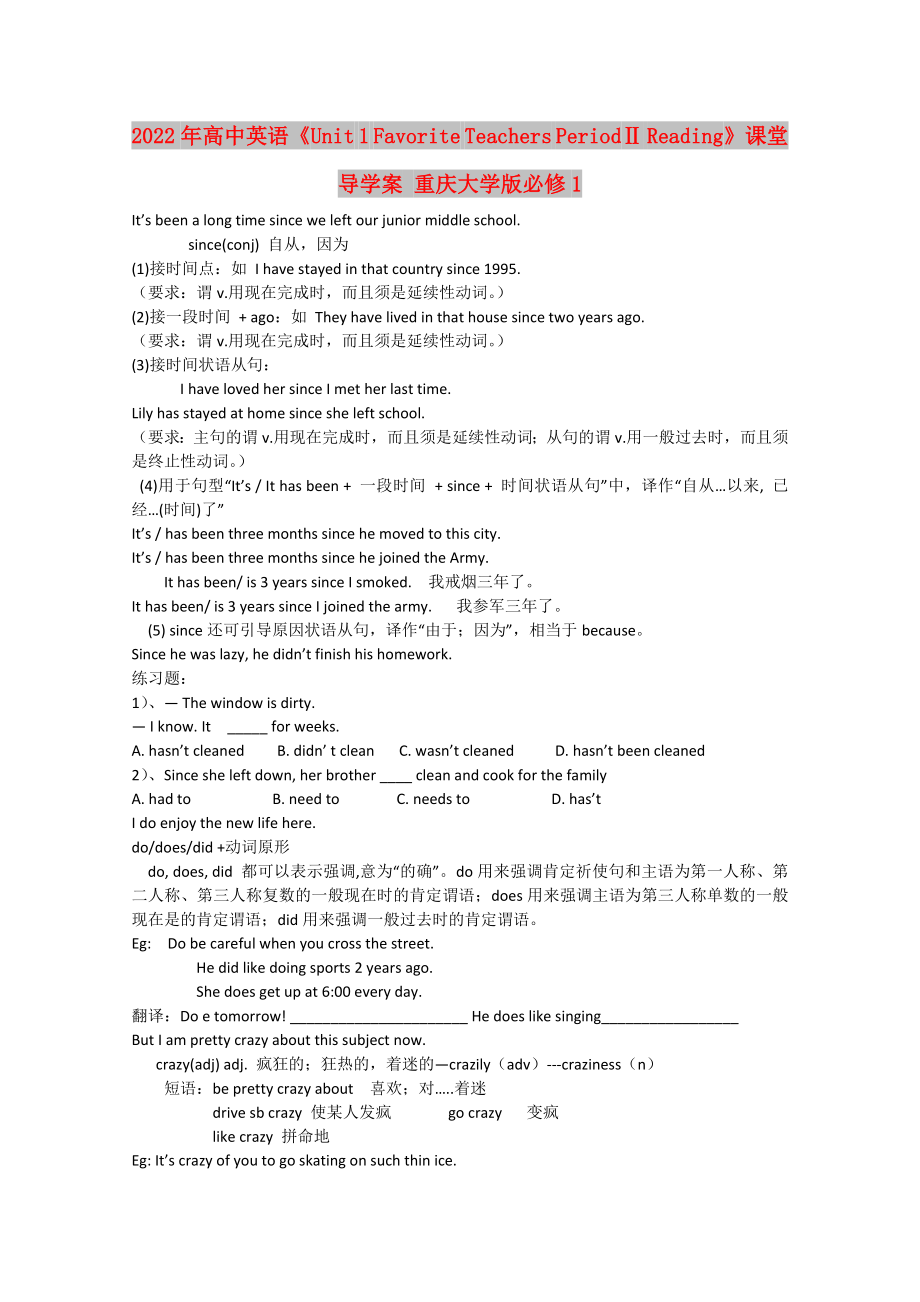《2022年高中英語《Unit 1 Favorite Teachers PeriodⅡ Reading》課堂導學案 重慶大學版必修1》由會員分享����,可在線閱讀,更多相關(guān)《2022年高中英語《Unit 1 Favorite Teachers PeriodⅡ Reading》課堂導學案 重慶大學版必修1(3頁珍藏版)》請在裝配圖網(wǎng)上搜索����。
1、2022年高中英語《Unit 1 Favorite Teachers PeriodⅡ Reading》課堂導學案 重慶大學版必修1
It’s been a long time since we left our junior middle school.
since(conj) 自從��,因為
(1)接時間點:如 I have stayed in that country since 1995.
(要求:謂v.用現(xiàn)在完成時���,而且須是延續(xù)性動詞��。)
(2)接一段時間 + ago:如 They have lived in that house since two years
2���、ago.
(要求:謂v.用現(xiàn)在完成時,而且須是延續(xù)性動詞�。)
(3)接時間狀語從句:
I have loved her since I met her last time.
Lily has stayed at home since she left school.
(要求:主句的謂v.用現(xiàn)在完成時,而且須是延續(xù)性動詞�����;從句的謂v.用一般過去時,而且須是終止性動詞�。)
(4)用于句型“It’s / It has been + 一段時間 + since + 時間狀語從句”中,譯作“自從…以來, 已經(jīng)…(時間)了”
It’s / has been three m
3��、onths since he moved to this city.
It’s / has been three months since he joined the Army.
It has been/ is 3 years since I smoked. 我戒煙三年了��。
It has been/ is 3 years since I joined the army. 我參軍三年了���。
(5) since還可引導原因狀語從句,譯作“由于����;因為”,相當于because���。
Since he was lazy, he didn’t finish his homework
4����、.
練習題:
1)�、— The window is dirty.
— I know. It _____ for weeks.
A. hasn’t cleaned B. didn’ t clean C. wasn’t cleaned D. hasn’t been cleaned
2)、Since she left down, her brother ____ clean and cook for the family
A. had to B. need to C. needs to D. has’t
I do
5�����、 enjoy the new life here.
do/does/did +動詞原形
do, does, did 都可以表示強調(diào),意為“的確”。do用來強調(diào)肯定祈使句和主語為第一人稱�、第二人稱、第三人稱復數(shù)的一般現(xiàn)在時的肯定謂語���;does用來強調(diào)主語為第三人稱單數(shù)的一般現(xiàn)在是的肯定謂語����;did用來強調(diào)一般過去時的肯定謂語��。
Eg: Do be careful when you cross the street.
He did like doing sports 2 years ago.
She does get up at 6:00 eve
6���、ry day.
翻譯:Do e tomorrow! ______________________ He does like singing_________________
But I am pretty crazy about this subject now.
crazy(adj) adj. 瘋狂的��;狂熱的��,著迷的—crazily(adv)---craziness(n)
短語:be pretty crazy about 喜歡�;對…..著迷
drive sb crazy 使某人發(fā)瘋 go crazy 變瘋
l
7�����、ike crazy 拼命地
Eg: It’s crazy of you to go skating on such thin ice.
The kids went crazy when the film star appeared.
Mr Mills is our English teacher, and I’m very much impressed by his devotion to teaching.
米爾斯先生是我們的英語老師����,他獻身于教學的精神給我留下了深刻的印象�����。
Impress(v)給某人留下印象
①be impressed by
8���、②impress sth. on sb. ③ leave /make an impression
devotion n. devote的句型:devote oneself to sth = sb. be devoted to sth
The woman impressed me badly.
==The woman left a bad impression on me.
She devoted herself to educating her children when her husband died.
==She was devoted to educating her ch
9、ildren when her husband died.
He always prepares his lessons well before class and acts out what he wants to teach in class.
他總是在課前準備好課并在上課時把他橡膠的內(nèi)容繪聲繪色地描述出來����。
1)What引導的是賓語從句,在賓語從句中作_____語����。
2)prepare(V) 準備-----preparation(n)準備
短語: prepare to do 準備…. be well prepared for準備好…..
10��、 prepare sb sth 為某人準備…
prepare breakfast/ lunch /supper 準備早餐���、午餐��、晚餐
prepare for sth 為…..做準備
翻譯下列句子����。
同學們正在為高考做準備。___________________________________________
他們準備接受他們的條件��。________________________________________
Through his sense of humour , he has made learning more enjoyab
11����、le.
sense(n)感覺、意識���;判斷力(v)察覺到
a sense of sight/hearing/ touch /smell/taste 視覺���、聽覺、觸覺����、嗅覺、味覺
in a sense 在某種意義上 make sense 有意義�����;講得通���;言之有理
a sense of responsibility 責任感��,責任心 mon sense 常識
good sense n. 判斷力強���;通情達理 a sense of humor 幽默感����,幽默
make sense of 理解
12����、 a sense of belonging 歸宿感,歸屬感
a sense of beauty/ duty /direction n. 美感�����;審美感 /責任感/方向感
There is no sense /point in doing sth 做…….沒意義
e to one’s sense 蘇醒過來/醒悟過來 in no sense 絕不
make no sense 無意義
翻譯下列句子����。
1)___________________________________那匹馬意識到危險,聽了下來���。
2)A dog has a keen sens
13、e of smell._____________________________________
3)______________________________________________ ____我不能理解你所說的���。
4) There is no __________ in persuading him to join us, and he won’t listen to you .
A. doubt B. chance C .sense D. possibility
7. Besides, he helps us to learn English
14���、in an imaginative way, using such aids as paintings, recordings, cartoons, and flash cards.而且���,他還通過圖畫,唱片�����,卡通和幻燈片等輔助工具幫助我們用一種富有想象力的方式學習英語�����。
1.) 用besides或except填空
To learn English well, writing and reading are also important __________ listening.
It is too late to go to the cinema. __________it’s raining.
All of us passed the exam __________ Alice, so she was very sad.
2)using such aids as paintings, recordings, cartoons, and flash cards是現(xiàn)在分詞短語�����,做伴隨狀語��,using與he構(gòu)成主動關(guān)系
 2022年高中英語《Unit 1 Favorite Teachers PeriodⅡ Reading》課堂導學案 重慶大學版必修1
2022年高中英語《Unit 1 Favorite Teachers PeriodⅡ Reading》課堂導學案 重慶大學版必修1

